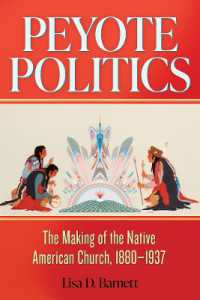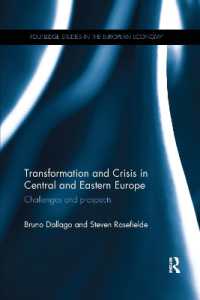- ホーム
- > 洋書
- > 英文書
- > Literary Criticism
Full Description
In German-Jewish Thought and Its Afterlife, Vivian Liska innovatively focuses on the changing form, fate and function of messianism, law, exile, election, remembrance, and the transmission of tradition itself in three different temporal and intellectual frameworks: German-Jewish modernism, postmodernism, and the current period. Highlighting these elements of the Jewish tradition in the works of Franz Kafka, Walter Benjamin, Gershom Scholem, Hannah Arendt, and Paul Celan, Liska reflects on dialogues and conversations between them and on the reception of their work. She shows how this Jewish dimension of their writings is transformed, but remains significant in the theories of Maurice Blanchot and Jacques Derrida and how it is appropriated, dismissed or denied by some of the most acclaimed thinkers at the turn of the twenty-first century such as Giorgio Agamben, Slavoj Žižek, and Alain Badiou.
Contents
Acknowledgements
Introduction
I Tradition and Transmission
1. Early Jewish Modernity and Arendt's Rahel
2. Tradition and the Hidden: Arendt Reading Scholem
3. Transmitting the Gap in Time: Arendt and Agamben
II Law and Narration
4. "As if Not": Agamben as Reader of Kafka
5. Kafka, Narrative, and the Law
6. Kafka's Other Job: From Susman to Žižek
III Messianic Language
7. Pure Languages: Benjamin and Blanchot on Translation
8. Ideas of Prose: Benjamin and Agamben
9. Reading Scholem and Benjamin on the Demonic
IV Exile, Remembrance, Exemplarity
10. Paradoxes of Exemplarity: From Celan to Derrida
11. Two Kinds of Strangers: Celan and Bachmann
12. Exile as Experience and Metaphor: From Celan to Badiou
13. Geoffrey Hartman on Midrash and Testimony
Epilogue: New Angels
Notes
Bibliography
Index








